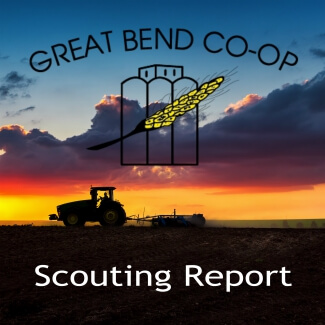Scouting Report - August 12, 2019
Aug 12, 2019

Corn – Pollination to Early Dent – Dryland corn is starting to show intense drought stress. Pollination was variable. Finding increased infestations of earworm. However, once they are in the husk, treatment is difficult and often unsuccessful. Spidermites are present and treated fields have been showing positive control so far.
Soybeans – Soybeans are in the Podding Stages. Finding hollowed stems from Dectes Stem Borer larva tunneling in the plant. These fields will be very susceptible to lodging at or before harvest time. Treatments at this stage are typically very unsuccessful, so planning for timely harvest is key to avoiding major loss. Scout for pod damage from cloverworm, podworm, and grasshoppers in the upcoming days and weeks.
Milo – Milo is in Boot to Early Heading stages. Heading through Hard Dough is when milo is most susceptible to damage from headworms. Still no reports of Sugar Cane Aphid in our area. Remember, when treating for headworm, a fungicide can be added to the same tank. Fungicides on milo have proven to increase plant health, drought stress, and standability at harvest.
Alfalfa – Finding increasing numbers of webworms in alfalfa. According to KSU recommendations, cutting is your best control option. However, if you are more than 2 weeks from cutting and finding webbing on 25-30% of terminals, insecticide treatment may be warranted.
Soybeans – Soybeans are in the Podding Stages. Finding hollowed stems from Dectes Stem Borer larva tunneling in the plant. These fields will be very susceptible to lodging at or before harvest time. Treatments at this stage are typically very unsuccessful, so planning for timely harvest is key to avoiding major loss. Scout for pod damage from cloverworm, podworm, and grasshoppers in the upcoming days and weeks.
Milo – Milo is in Boot to Early Heading stages. Heading through Hard Dough is when milo is most susceptible to damage from headworms. Still no reports of Sugar Cane Aphid in our area. Remember, when treating for headworm, a fungicide can be added to the same tank. Fungicides on milo have proven to increase plant health, drought stress, and standability at harvest.
Alfalfa – Finding increasing numbers of webworms in alfalfa. According to KSU recommendations, cutting is your best control option. However, if you are more than 2 weeks from cutting and finding webbing on 25-30% of terminals, insecticide treatment may be warranted.